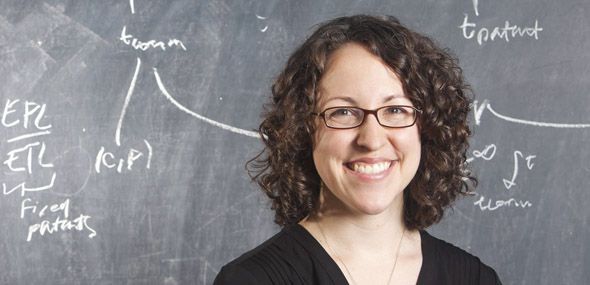Heidi Williams wins MacArthur "genius grant"
Economist who studies the economics of innovation wins $625,000 prize.
 photograph: MacArthur Foundation
photograph: MacArthur Foundation
Williams researches the causes and consequences of technological change in health care markets. Her broad goal is to shed light on the economics of innovation in a context — health care —that has important consequences for human health and welfare, and which is critical to national fiscal policy.
Excerpt from article by Peter Dizikes, MIT News Office
September 29, 2015 — MIT economist Heidi Williams, whose scholarly work looks at the effects of patent policies and technology on medical research and health care, has been granted a 2015 MacArthur Fellowship.
The high-profile annual fellowships, unofficially known as “genius grants,” include an award of $625,000 that is paid over five years and is unrestricted, meaning recipients are allowed to use it as they see fit. There are usually fewer than 25 MacArthur Fellowships awarded each year.
Williams says she is “very humbled and extremely grateful” to be a recipient of the fellowship. Upon being informed of the award by an official with the MacArthur Foundation, she adds, “I was completely speechless.”
Williams, the Class of 1957 Assistant Professor in the Department of Economics, emphasized that the award was a reflection of the intellectual atmosphere and encouragement she has received from colleagues in her department.
“I’ve really been extremely grateful to my department here at MIT,” Williams says. “The department in general has just been so supportive.”
What affects the pace of medical research?
Williams says she aims to conduct “empirically-grounded, socially useful” research. In practice, she has produced methodologically rigorous studies on questions such as whether or not intellectual property rights influence the pace of biomedical research, and how the use of certain technologies affects health care outcomes and costs.
Williams’ best-known study, published in 2013, examined the effects of intellectual property rights within biomedical research — through the lens of the celebrated “race” to sequence a version of the human genome, between the private firm Celera and the government-backed Human Genome Project.
Williams concluded that granting intellectual property rights to Celera for its discoveries reduced subsequent scientific research and product development by 20 to 30 percent, relative to the pace of research and development seen after the Human Genome Project’s later work put the same information in the public domain.
Suggested links
Study: Firms “underinvest” in long-term cancer research
Webpage